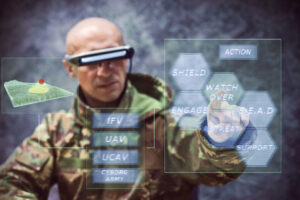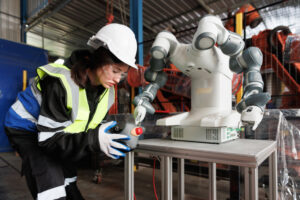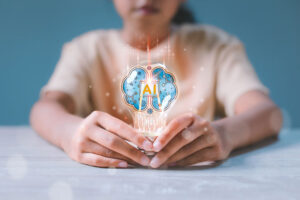Written by Scott Wilson

There’s a lot of big talk about AI right now. It’s coming out of Silicon Valley, DC think tanks, and pouring out from every news outlet and podcast today. No matter the tone the voices strike or the angle their messaging comes from, at some point the conversations always circle back to what it all means for employment and employability. Those concerns are shared equally between the current generation of workers, and the next one.
The fact is, developments in AI are going to impact some fields much more than others. It’s the knowledge professions, though, that are sure to face the most profound disruptions, and employment levels in those industries could change dramatically.
AI is set to revolutionize the way knowledge work gets done. In these industries there will be a clear dividing line: Before AI and After AI.
Before AI, knowledge-based jobs that required thinking and problem-solving were safe from automation… and after AI, jobs that revolve around using AI tools to augment human ingenuity and problem-solving skills are going to be the best way to future-proof a career.




Models from the Past Show What this Workforce Transformation Will Look Like
 In New York city at the dawn of the industrial revolution, the folks who specialized in shoeing horses had a brisk business. Before the neighborhood tire shop, there were thousands of farriers, as they were called, in every borough working around the clock to shoe the 200,000 horses the city relied on to keep industry turning.
In New York city at the dawn of the industrial revolution, the folks who specialized in shoeing horses had a brisk business. Before the neighborhood tire shop, there were thousands of farriers, as they were called, in every borough working around the clock to shoe the 200,000 horses the city relied on to keep industry turning.
But by the end of the industrial revolution, as trucks powered by internal combustion engines took over, it was a very different story. If you made your living shoeing horses, the best bet for you in the post-automobile world was to find a job doing the modern equivalent: shoeing cars.
Many of those individuals kept their livelihood by re-skilling: from bending horseshoes they learned to fit hubs and tires. They effectively future-proofed their roles in the transportation industry with a little extra time and effort learning the new systems.
By focusing on the technology that replaced what they were working with before, they stayed relevant. It’s likely to be a very similar story in the post-AI world.
Before and after may not happen overnight, but it could be within a decade.
If you’re working in one of the many knowledge professions that until recently seemed safe from automation, it’s time to think about doing some future-proofing to secure your position in the post-AI world.
The AI Future-Proof Strategy Revolves Around Education
It won’t take a Sarah Connor level toe-to-toe with Skynet to contend with what’s to come, but it will take a serious commitment to getting into shape to be able to rise to the challenge.
AI won’t take your job. It's somebody using AI that will take your job.
~ Richard Baldwin, professor of international economics, Geneva Graduate Institute
And if there is anything to take away from the rapid and incredible development of AI, it’s that you never say never. Professions once seen as unassailable in the realm of human expertise are falling one by one:
- Computer Programming
- Visual Arts and Graphic Design
- Writing
- The Law
As impossible as it was even a few short years ago to imagine those roles performed by a machine, the latest iterations of generative AI have delivered amazing results. While there is some quibbling around the margins about their abilities, it’s silly to imagine they aren’t going to improve… and fast.
Now Is the Time to Think Through the Education You Need to Secure Your Future
 Whether you’re just entering the job market or have most of a successful career already in the rear-view mirror, you’d better be thinking about how you’re going to respond.
Whether you’re just entering the job market or have most of a successful career already in the rear-view mirror, you’d better be thinking about how you’re going to respond.
One of the tough problems in this moment in time is that it’s hard to see exactly how the market will shift. Will it take decades, or years? Will AI takeover entirely, or just augment current professionals? What will it do well, and what jobs will still require human ingenuity and experience?
How do you go bankrupt? Two ways. Gradually and then suddenly.
~ Ernest Hemingway
If you think you’re in good shape where you are, it’s time to think again. Advances in the field are coming quickly. While it’s possible the researchers will hit a brick wall at some point, that’s not a bet you want to make. So far, the surprises have all been on the up-side of AI competency.
You can’t know the details of exactly how or when AI will start eliminating talented people, from artists to coders. All you can do is invest in the skills that will let you pivot with the blow.
So think of future-proof, in this scenario, as equipping yourself with the information, the credentials, and the understanding to adapt to whatever comes next. As amazing as the AI-powered future may be, someone will need to oversee the machines. With the right degree, that can be you.
Master’s Degrees in Artificial Intelligence Are Among the Most Hardcore of All STEM Programs
 Let’s be clear, though: it’s one thing to be familiar enough with ChatGPT to short-cut your emails and another thing entirely to learn how to advance and expand the reach of AI within your industry. Understanding and improving the potential of computational intelligence isn’t something the average office drone can do after a few courses.
Let’s be clear, though: it’s one thing to be familiar enough with ChatGPT to short-cut your emails and another thing entirely to learn how to advance and expand the reach of AI within your industry. Understanding and improving the potential of computational intelligence isn’t something the average office drone can do after a few courses.
We’re talking about graduate programs in some of the most advanced technologies that mankind has ever invented. This is hardcore learning at the leading edge of math, statistics, and computer science. Before you even think about these career options, you’d better have a four-year undergrad degree that has walked you through subjects like:
- Calculus
- Programming
- Logic
- Data Systems
It’s also the case that a degree in AI won’t save you from job categories that AI itself will simply shred and replace. Certain administrative roles, legal research, or investment advising are careers that may not be long for this world no matter how well-qualified you are.
Degrees in artificial intelligence are aimed at the technical side of any industry. The positions that these will put you in are a long way from the actual day-to-day work in most of these industries. Instead, they place you above the fray. You will pick up the skills and insight to build, manage, and interpret for machine intelligence that is doing the heavy lifting.
Meet the Advanced Skillsets That Will Insulate You From AI-Induced Job Losses
The kind of skills you’ll need to secure your relevance and employment are going to be remarkably similar from industry-to-industry. Artificial intelligence has some common roots that it relies on, no matter what the applications are.
Math
First and foremost, you’ll need a strong command of math and statistical science. That’s true whether you’re interested in the arts or bioengineering… today’s computational reasoning rests on the ones, zeros, and proliferation of higher-level math that processors churn through. There’s no getting away from the role of probabilities and measurements in building artificial intelligence systems.
Algorithms
Algorithms and machine learning is the next must-have. An algorithm is just a set of step-by-step instructions that can be followed to derive a result from a set of input data. Humans use algorithms all the time:
When refrigerator milk = 0, increment trip store schedule +1
Computers are particularly adept at following such logical outlines for behavior quickly and accurately. They can deal with highly complex and mathematically intensive algorithms much better than a human. But humans still have to set up the outlines for those algorithms first.
Data Science
 Those algorithms need something to chew on. That’s data, and understanding how to acquire and feed it to the machine is what you’ll need to know from the field of data science.
Those algorithms need something to chew on. That’s data, and understanding how to acquire and feed it to the machine is what you’ll need to know from the field of data science.
Computers are far more adept at working with certain types of data than others—numbers are a piece of cake (in fact, all they ever really work with, when you get down to it), pictures not so much. You’ll need to understand what and why, and how to turn the tough types of information into easier ones, and what the implications are for your machine intelligence.
Programming
Plenty of famous architects in the history of AI did their work at the purely conceptual level. Thinking big thoughts is still a part of the job, but you’ll also have to know how to bring your ideas to life through code.
Students are expected to bring basic levels of programming skills to the table when they apply. The coursework in AI degrees is aimed more at learning the specific structures and concepts used in AI programing.
Knowledge and Reasoning
 Ontology in computer science is the study of categorization and relationships—the great big database that holds all the knowledge of the world. The algorithm you build and work with will all traverse the domain of that information, so you will need to understand how it works at a deep level.
Ontology in computer science is the study of categorization and relationships—the great big database that holds all the knowledge of the world. The algorithm you build and work with will all traverse the domain of that information, so you will need to understand how it works at a deep level.
These courses will also stray into the science and philosophy of logic and reasoning. You’ll learn how to break down problems and parse them, how people solve them, and how machines might begin to do so.
Ethics
All of this knowledge and power is heady stuff. It comes with responsibilities, which is why pretty much every advanced degree in AI also includes courses in ethics and the philosophy of AI. These teach the controversies of developing AI and highlight some of the tripping hazards you’ll face:
- Algorithmic bias
- Privacy concerns and rules
- Copyright concerns
- Transparency considerations
There are many other specific areas of knowledge that you may dive into with different types of degrees and industries of expertise, everything from natural language processing to biomechanics. The right choices there will definitely depend on your industry.
Three AI Degree Categories: Picking the Right AI Degree Type for Your Industry and Job Goals

The choices you have will also depend on the degree or certificate path that you select. While the AI education world is changing almost as fast as the AI industry, today there are three common categories these programs tend to fall into.
The ways that AI will be disruptive are crystal clear for some fields. In others, they remain mysterious.
Type One - AI Engineering Degrees to Lean How to Design and Build Artificial Intelligence Systems
The science of AI is still being hammered out in a hundred labs and office parks where startups are working at all hours. All those projects need hardcore computer and data science experts to craft, implement, and test the latest ideas for training ML algorithms, integrating control systems, and developing thinking machines.
- Future-Proofing Computer Science and Programming Careers With AI-Focused Master’s Degrees or Certificate Courses
- Future-Proofing Information Technology Careers With AI-Focused Master’s Degrees or Certificate Courses
- Future-Proofing Data Science Careers with AI-Focused Master’s Degrees or Certificate Courses
Type Two - AI Degrees for Mastering AI Tools with Business Applications
While there is a huge need right now for highly technical experts for research and development in machine learning, computer vision, and robotics, there’s also a hidden wave of demand building for big picture thinkers in the field. These are the engineers: leaders with the vision to see and understand how cutting-edge AI tools can be applied to specific problems in engineering and industry.
- Future-Proofing Cybersecurity Careers with AI-Focused Master’s Degrees or Certificate Courses
- Future-Proofing Careers in Business with AI Master’s Degrees or Certificate Courses
- Future-Proofing Graphic Design, Arts and Entertainment Careers with AI-Focused Master’s Degrees or Certificate Courses
- Future-Proofing Careers in Government with AI-Focused Degrees or Certificate Programs
- Future-Proofing Financial Services Careers with AI-Focused Master’s Degrees or Certificate Courses
- Future-Proofing Marketing Careers with AI-Focused Master’s Degrees or Certificate Courses
Type Three - AI Degrees to Make a Bigger Impact in Completely Different Fields, From Medicine to Law
The capabilities of AI are quickly taking these tools into the realm of human experts in some highly complicated fields. Medicine, engineering, transportation… AI is poised to make profound advances in all of them and more.
Since these topics are so complex and so specialized, there’s a pressing need for humans with expertise in artificial intelligence and a strong subject matter knowledge to make the connections. So you’ll find a range of degrees, and particularly certificate programs, popping up to bridge the gaps.
- Future-Proofing Healthcare Careers with AI-Focused Master’s Degrees or Certificate Courses
- Future-Proofing Transportation and Supply Chain Careers with AI-Focused Master’s Degrees or Certificate Courses
- Future-Proofing Engineering Careers with AI-Focused Master’s Degrees or Certificate Courses
- Future-Proofing Careers in Education with AI-Focused Master’s Degrees or Certificate Courses
Make no mistake, these are all highly technical programs with considerable programming, mathematical, and statistical training. At the master’s level, you need to be able to walk and chew bubble gum… that means earning a command of core AI skills as well as the other specialized tasks of your field.
If you’ve got the chops to make that happen, then an AI degree is your ticket to a shot at perpetual employment in any of these industries.
We’ll look at careers covered by each of these categories, together with why AI threatens jobs in those industries and how your AI master’s degree will protect you.
Future-Proofing Computer Science and Programming Careers With AI-Focused Master’s Degrees or Certificate Courses
 Jobs in the broader field of computer science will include those that are creating new machine intelligence systems, but also those that are easily replaced by them. While even a few short years ago a degree in computer science or a related field was seen as a full ticket to lifetime employment, today it’s easy to see even high-end jobs being threatened.
Jobs in the broader field of computer science will include those that are creating new machine intelligence systems, but also those that are easily replaced by them. While even a few short years ago a degree in computer science or a related field was seen as a full ticket to lifetime employment, today it’s easy to see even high-end jobs being threatened.
But it’s been people in computer science who have seen the shocking reality coming first. Even as they work in fields that have been building the foundations of AI, the technology itself has advanced to the point where they can see the writing on the wall. In many cases, such as writing code, providing technical support, or building websites, AI has quickly come to surpass the average level of expertise in the field.
Master’s Degrees in AI for Researchers and Technologists
 Fortunately, there’s going to be so much demand across such a broad scope of uses and industries that AI-related jobs in computer science will be in demand for decades to come. Every other type of AI engineering that is discussed on this page will only happen with skilled and dedicated AI experts building out the core capabilities.
Fortunately, there’s going to be so much demand across such a broad scope of uses and industries that AI-related jobs in computer science will be in demand for decades to come. Every other type of AI engineering that is discussed on this page will only happen with skilled and dedicated AI experts building out the core capabilities.
Degrees that cater to straight compsci and data science professionals are the real deal for pure AI study. There’s little question this is where most of the action is, too. AI research is still breaking new ground. The fundamentals are being explored and worked out by the graduate students in these programs.
So they are heavy on the core tools and concepts behind AI:
- Mathematics and statistics
- Evaluating and building machine learning algorithms
- Data science concepts and processes
- AI frameworks and theory
- Ontology and reasoning
- Human-computer interactions
They are usually offered by computer science departments. In fact, they often hold a Master of Science in Computer Science with a concentration in artificial intelligence. That tells you exactly where the focus is!
Since graduates from these programs are also going to be the ones putting AI into more traditional computing fields, ranging from networking to security, you’ll also find them with specializations in those areas.
The curriculum in these degrees veer more toward theory and often involve more cutting-edge research than other AI degrees. Since graduates from these programs will be the ones moving the industry forward into the unknown, studies aren’t channeled too specifically into practical applications. Instead, you’re expected to move forward with the knowledge and skills you build to create intelligent systems and applications that no one has even dreamed of yet.
Future-Proofing Information Technology Careers With AI-Focused Master’s Degrees or Certificate Courses
 Information technology is an industry that contains the field of artificial intelligence itself, so it’s clear that there are going to be some serious impacts as AI evolves. But IT includes many other sub-fields. Each represents significant capabilities and investments in millions of employees with billions of dollars:
Information technology is an industry that contains the field of artificial intelligence itself, so it’s clear that there are going to be some serious impacts as AI evolves. But IT includes many other sub-fields. Each represents significant capabilities and investments in millions of employees with billions of dollars:
- Communications and networking
- Programming and application development
- Web development
- Computer hardware development
- Information storage and processing
- Systems support
Why Careers in Information Technology Are Threatened
All of those will register their own impacts as AI gets rolling in the IT space. The overall promise of IT has always been efficiency. And there’s nothing more efficient than a fully automated, fully autonomous system.
Even in the early days of the field, AI has already proven itself worthy in some core IT functions:
- Programming - Generative AI systems have been able to turn natural language into fully functional programs, and help coders troubleshoot and optimize their output
- Process automation - In theory, many IT processes are already capable of running completely autonomously. In practice, bugs and glitches outside the realm of code mean sysadmins must watch out for everything from power failures to running out of disk space. But AI promises to bring a layer of adaptability to automation that is faster and more streamlined.
- Optimization - When it comes to eking out efficiency in storage and computation, machine learning algorithms are likely to be second to none. They’ll also be faster and more on point when it comes to allocating and reallocating resources.
- Support - Generative chat systems can already answer common IT questions faster and more fluently than many IT support staff. Plugged directly into corporate systems, they are likely to take over both phone (through advanced voice recognition) and first-level chat support.
That is going to put millions of jobs on the line in IT departments around the world. But with a degree in AI engineering, yours won’t be one of them.
How an AI Certificate or Degree Will Secure Your Position in Information Technology
AI experts are going to be big in the IT industry for decades to come. That’s because the dream of AI is going to run aground on the same rocks that information technology itself has for so many years… grand ideas are one thing. Implementation is something else.
So where the rubber meets the road, there is going to have to be troubleshooting, further development, training, and oversight as IT processes are turned over to AI. Skilled engineers who also have a fundamental knowledge of systems administration, computer architecture, and support processes are going to be doing the heavy lifting of tying algorithms to domain-specific information in hundreds of different industries with unique IT demands.
Future-Proofing Data Science Careers with AI-Focused Master’s Degrees or Certificate Courses
 Data science is one of the primary fields that has led to breakthroughs in AI today. But that doesn’t make it immune to disruption from artificial intelligence.
Data science is one of the primary fields that has led to breakthroughs in AI today. But that doesn’t make it immune to disruption from artificial intelligence.
As the science of storing, analyzing, and drawing important lessons from large volumes of disparate data, this field has been home to the cultivation of machine learning for decades. But it’s also feeling the heat from new automated systems that threaten to sideline all those highly trained analysts and statisticians.
Why Careers in Data Science Are Threatened
Data scientists field questions from experts in dozens of fields and turn them into mining operations that unearth answers from unimaginable reams of information. One of the primary techniques they have for doing so is putting together algorithms and code to parse and analyze all that information.
That’s already halfway to being a functioning artificial intelligence system as it is. When you drop in the natural language processing and self-learning algorithmic processes for writing code in R, Python, or SQL, then you’ve built yourself a digital data scientist that can do the same work without the middleman.
In fact, automated machine learning, or AutoML, has been rolled out by big companies like Google to allow automated model training by non-data scientists. It’s been used to help create models to identify Alzheimer’s disease risk markers in genetic tests and to catalog and classify disparate digital, print, and video content catalogs.
Assembling and managing training data is also an important role for data scientists. But AI is already being used for synthetic data generation, using it to train and reinforce other ML models. And in some cases, it’s even learning how to augment existing datasets for more robust training models.
How an AI Certificate or Degree Will Secure Your Position in Data Science
AI and ML seem perfectly poised to allow average people to directly query big datasets. But for now, the field still involves the kind of creativity that machines aren’t yet in range of.
One of the most important functions of a data scientist is simply to know what kinds of questions are reasonable to ask. While any executive can ask an AI for a forecast of second quarter results, it takes an experienced data scientist to understand what kinds of underlying data may be available, how reliable they need to be for solid results, and what the implications of different ways of arriving at the answer might be.
There is also going to be a real need for interpretation of the kind of results that AI might generate from big data. In fact, that might be one of the premier roles for AI engineers in many fields: to take a stab at explaining how the machine arrives at its answers.
This is important both for purposes of trust and for understanding.
The Answer to the Great Question of Life, the Universe, and Everything is… forty-two.
~ Deep Thought, supercomputer in The Hitchhiker’s Guide to the Galaxy.
Without a sophisticated understanding of the meaning of the questions being asked, the answers may be worthless.
Of course, data science will remain a core building block for new AI systems, too. To build those systems, data scientists with AI expertise are going to be needed for decades. So your AI certificate or advanced AI degree can be a perpetual employment booster.
Future-Proofing Cybersecurity Careers with AI-Focused Master’s Degrees or Certificate Courses
 Cybersecurity has been on a sort of parallel track of growing importance over the same timespan that artificial intelligence has been building in utility. Rather than a generative field, though, cybersecurity is protective: the systems that execute software and the data they hold have to be secure to be useful.
Cybersecurity has been on a sort of parallel track of growing importance over the same timespan that artificial intelligence has been building in utility. Rather than a generative field, though, cybersecurity is protective: the systems that execute software and the data they hold have to be secure to be useful.
The importance of this field combined with the genuine advantages that come with high-speed, adaptive AI makes it ripe for tools that will displace jobs, though.
Why Careers in Cybersecurity Are Threatened
AI is going to be faster and more in-tune with cybersecurity than human experts ever could be. Entire categories of data analysis that no human could enter into, even with the assistance of advanced tools, will be on the table for AI cybersecurity programs. Signals analysis spanning thousands of contact points, looking at network traffic instantly at a level of detail that no person could handle, could spot attacks immediately.
Another reason that AI is going to quickly become dominant in cybersecurity is because it will become dominant in cyberattacks. Hackers have no qualms about using the best tools available to penetrate and compromise systems. Already, AI-generated deepfakes have demonstrated the ability to fool biometric identification systems. ChatGPT is being used by non-native speakers to craft improved spear-phishing email attacks. And AI is generating polymorphic virus code to evade traditional signature-based scanners.
The only thing that will be able to keep up with such sophisticated and automated attacks are AI defensive systems.
How an AI Certificate or Degree Will Secure Your Position in Cybersecurity
Cybersecurity experts with artificial intelligence chops will have two major roles in the foreseeable future of the industry:
- Find ways to use AI itself more effectively in cyber defense than hackers can use it in cyberattacks
- Protect the systems executing AI training and code themselves to prevent compromises that could lead to corrupt or failed AI processes
As in any kind of cyber defense, the better you know the tools and systems, the more effective you will be at assessing vulnerabilities. And intimate familiarity with machine learning, adversarial neural network attacks, and the state-of-the-art in natural language generation is going to be mandatory for cybersecurity experts soon.
The kind of ethics training that comes with AI master’s studies will also be important in the cybersecurity field. In fact, cybersecurity experts with AI training might find roles in other organizations working on AI, red teaming their development efforts to make sure they can’t be used by bad actors.
Also, with increasing amounts of programming handled by AI systems, there will be a demand for cybersecurity experts to review code. Although AI will come up with programming solutions that people might not, it may also be subject to creating security holes that humans might not. Only cybersecurity pros with an understanding of how AI works will be able to review and secure that generated code.
Future-Proofing Careers in Business With AI-Focused Master’s Degrees or Certificate Courses
 The business world is where artificial intelligence will find its way into the daily lives of most people in the world. It’s where products and services that rely on AI and ML-based systems will be developed. It’s where companies will strive for competitive advantage by developing back-end processes with AI that are faster and more efficient than the competition.
The business world is where artificial intelligence will find its way into the daily lives of most people in the world. It’s where products and services that rely on AI and ML-based systems will be developed. It’s where companies will strive for competitive advantage by developing back-end processes with AI that are faster and more efficient than the competition.
Government, too, will see profound impacts from the roll-out of AI. In addition to similar uses to speed up and make the business of governance more efficient, governments will also be responsible for regulating and overseeing how the technology is used in the private sector.
In every case, these organizations are going to be shedding jobs that are made redundant by AI. But they are also going to be stacking on AI experts to help them understand how the tech works and how best to use it.
Master’s degrees in artificial intelligence offer you a solid way to future-proof your career in any of these industries, too.
Master’s Degrees and Certificates in AI For Business and Industry Roles
 These master’s degrees aren’t always that different from those that you find aimed at computer science majors. In fact, you may well find that the same program goes both ways, depending on the concentration option you pick.
These master’s degrees aren’t always that different from those that you find aimed at computer science majors. In fact, you may well find that the same program goes both ways, depending on the concentration option you pick.
But as a matter of attitude and orientation, these degrees will lean toward practical applications of AI and ML technologies available today. They will still involve you in research and cutting-edge tech, but you’ll often notice that they have courses that are aimed at existing uses for AI. Those can include:
- Foundations of Computer Vision
- Algorithm Design and Analysis
- Principles of Machine Learning
They may also have core class requirements that give a hint to their applied or business-oriented nature. These are more general studies that apply beyond the AI world, but can be important in connecting your AI development work to real-world applications:
- Computer Science Management
- Principles of Software Development
- Operating System Foundations
This type of AI degree is often also offered in a dual-major format with MBA and other types of business leadership degree programs.
This kind of coursework is aimed at building strong leadership and planning skills on top of elementary data manipulation and program design. Graduates are expected to understand business processes like accounting, finance, and marketing before being entrusted to apply their AI knowledge to specific functions and processes in their industry.
Often, these degrees are completed with a capstone project option rather than a traditional master’s thesis… although you may have both options available.
Future-Proofing Graphic Design, Arts and Entertainment Careers with AI-Focused Master’s Degrees or Certificate Courses
 Arts and entertainment have long seemed to be fields that automation would leave untouched. The expression of emotions, the ability to connect and communicate very human truths, to see and create beauty… these have been qualities that no computer could claim.
Arts and entertainment have long seemed to be fields that automation would leave untouched. The expression of emotions, the ability to connect and communicate very human truths, to see and create beauty… these have been qualities that no computer could claim.
At least, until generative transformers learned how to take them from human works and mimic them with unbelievable fidelity.
The arts world is feeling the heat more than perhaps any other industry today. While technical jobs in this field are few and far between, they are likely to become some of the most stable as neural networks march toward new heights in creativity.
Why Careers in Arts and Entertainment Are Threatened
Of all the fields where roles are threatened by artificial intelligence, arts and entertainment may have generated the most visceral and public response. Initial outcries when new tools like Stable Diffusion and ChatGPT were unveiled came from the arts community. Writers and artists whose work had been used to train the models, from Stephen King to John Grisham, filed suit against OpenAI over the unauthorized use of their works.
And in the Hollywood actor and writer strikes of 2023, negotiations over contractual uses of AI to write screenplays or duplicate the likeness of characters and voices were a key sticking point.
Clearly, writers and actors have seen the beast, and found it to be a threat.
AI’s not going anywhere, not with Silicon Valley desperate for the Next Big Thing
~ John Lopez, member, Writer’s Guild of America
AI-generated works have hit publishing quickly, too, swamping the submissions teams at some publications overnight. Yet there’s a lot of excitement, too. Frustrated artists and writers who have great ideas but haven’t formed the artistic skills to realize it are eager to take AI tools and realize their dreams.
The arts world may ultimately be expanded by the introduction of AI—it’s hard to fire people working on their own time doing what they love. But it’s also likely to make it a lot more difficult to earn a living in a field where living wages are already few and far between.
How an AI Certificate or Degree Will Secure Your Position in the Arts and Graphic Design
Of course, your average actor or writer isn’t going to get job security in their field by earning a degree in artificial intelligence.
Yet within the entertainment industry as a whole, AI experts will be in huge demand.
The largest role for AI experts in arts and entertainment will probably be in developing the tools that allow creative professionals to realize their vision. While AI will develop many of the nuts and bolts of film, music, and written works, it’s only ever going to be responding to the inputs it has given.
With a famously non-technical user base, that means that AI systems are going to have to be created that are enormously user-friendly. The interfaces and interaction will need a lot of fine-tuning… and that’s where AI experts will be key.
AI also will be used as a supplement in many of the backend processes of arts and entertainment production. It’s already key in technologies used in de-aging special effects. Other models have been used to automate the casting process by reviewing past performances and matching talent with what the director is looking for. And post-production work is increasingly being automated through ML tools to fix color issues, punch up audio, and catalog and tag scenes.
Similar types of tools will be in demand and will require expert AI professionals to help develop and implement them.
Future-Proofing Careers in Government with AI-Focused Degrees or Certificate Courses
 Governance, at all levels, will be profoundly impacted by artificial intelligence. In fact, you can make the case that it already has been. In 2023, the Biden Administration issued an executive order laying down new standards for AI development and use within the federal government.
Governance, at all levels, will be profoundly impacted by artificial intelligence. In fact, you can make the case that it already has been. In 2023, the Biden Administration issued an executive order laying down new standards for AI development and use within the federal government.
When you throw in the fact that government is also going to be responsible for creating the laws and regulations that govern private industry AI applications, it’s a big lift. And it’s going to require serious, in-depth technical expertise to handle it.
Why Careers in Government Are Threatened
Government has plenty of functions that could benefit hugely from AI. Everything from modeling economic policy to real-time traffic management could become faster and more accurate.
Government gets knocked as a big warren of bureaucracy, but all that paper-shuffling is a big target for optimization with AI systems. Natural language processing-based AI can read forms, assist small businesses, and build friendlier and faster interactions for citizens everywhere from the DMV to the CFPB.
Yet there are also big risks that come with using AI in governance. With vast amounts of sensitive information about every citizen as well as enforcement powers, there are real fears that AI in the service of government could lead to oppressive policing. Even when used within traditional guard rails, the risk of systemic biases in AI algorithms have created controversy over systems used to recommend sentencing terms and identify suspects through facial recognition.
How an AI Certificate or Degree Will Secure Your Position in Government
Government agencies will be scrambling for a long time to keep up with the societal changes that come with widespread AI adoption. That’s going to make them big consumers of AI expertise.
National Defense Is the Most Future-Proof of Industries
 A unique subset of government’s work in AI will be in the defense and intelligence sector.
A unique subset of government’s work in AI will be in the defense and intelligence sector.
Intelligence work has already been utterly transformed by data science. The ability to dip into vast streams of information from satellites, phone intercepts, video monitoring, and other shadowy information sources generated by modern technology is unparalleled. Machine learning has allowed analysts to tie that data together and find trends and connections that were invisible before.
AI promises similar leaps in intelligence. And it’s creating new threats and delivering new capabilities in the world of defense, where autonomous drones and recon bots are already in testing.
AI expertise in this field needs the same crossover between the practical and the theoretical as other industries. But it’s also going to require top secret clearance and a razor-sharp sense of ethics and the laws of war. It’s a unique industry to work in, but one that’s never lacking for funding and jobs if you have the qualifications.
Governments at every level are going to need experts who have the kind of education to not just put AI to work and to develop systems, but to evaluate the impacts of AI in the community. The kind of ethics training that comes with advanced degrees in the field is invaluable for this purpose.
Government will also rely on experts with advanced degrees in AI to evaluate advances in private-sector AI development. As a technology that is going to have an impact in almost every aspect of modern life, it’s going to take the broad perspectives of a graduate-level education to predict the impacts. Government AI pros will advise decision-makers on everything from workforce development to safety regulations.
Government is also playing a big role in R&D; fields like intelligence and defense need specialized expertise that can’t come out of the private sector. AI engineers working directly for government will advise on investments and conduct research in sensitive areas of AI deployment.
Future-Proofing Financial Services Careers with AI-Focused Master’s Degrees or Certificate Courses
 The financial service sector is a behemoth in the American economy. The Bureau of Economic Analysis lumps it in with insurance, real estate, rental, and leasing operations. You can think of it in a similarly broad sense when you imagine the impacts of AI.
The financial service sector is a behemoth in the American economy. The Bureau of Economic Analysis lumps it in with insurance, real estate, rental, and leasing operations. You can think of it in a similarly broad sense when you imagine the impacts of AI.
Together, they represent more than 20 percent of added value to U.S. GDP as of 2022. The Bureau of Labor Statistics puts it down as creating over 900,000 positions each year.
Since it’s a field where almost every American has some skin in the game, AI disruptions here are important… and inevitable.
Why Careers in Financial Services Are Threatened
Using informational advantages to make money is nothing new. Arbitrage has been happening in markets ever since Sumerians lugged barley across the cradle of civilization to find better prices.
And in today’s financial services sector, traders are pushing technology to the limits. While algorithmic and high-frequency trading are generating massive profits, investment bankers don’t like to leave anything on the table. And generative AI has the potential to allow them to clean up even more.
Wall Street already sieves through some of the brightest physics and computer science graduates coming out of top colleges.
There’s no reason to think that artificial intelligence will be any different. Some of the brightest minds being hired on Wall Street today are coming out of some of the bastions of AI development: Mira Murati, CTO and interim CEO of OpenAI, started her career interning at Goldman Sachs.
Odds are good there are already substantial, shadowy AI projects underway in the back offices at high-frequency trading firms and major investment banks.
How an AI Certificate or Degree Will Secure Your Position in Financial Services
Banks and other retail finance firms are going to want AI systems that handle customer-facing services like support and retention. AI engineers may be working on systems to analyze accounts for suspicious transactions at an even faster and more sophisticated level than happens today. New types of risks can be assessed and caught in real time with the right AI engineering.
There are also going to be real risks in security and compliance when the AI wave hits the financial industry. It’s going to take every ounce of master’s-grade AI engineering expertise to keep the system stable and secure.
Of course, when it comes to trading, there’s money to be made with faster and more accurate predictive trading algorithms. Just as is happening today, big money investment firms are sure to be recruiting the top talent they can find to put those algorithms together… and you can bet they will be recruits with advanced degrees in AI.
Future-Proofing Marketing Careers with AI-Focused Master’s Degrees or Certificate Courses

You might think of the process of marketing and selling products to humans as being something that humans themselves will always have an edge with, but experience is proving otherwise.
Since marketing is an aspect of all sorts of other businesses and non-profits, this is a field where you can future-proof your career through an AI certificate or advanced degree in almost any industry.
Why Careers in Marketing Are Threatened
Sales and marketing are already seeing big impacts from generative AI. While big data processes run by machine learning algorithms have been a powerful force in developing marketing and product strategies for years now, the prospect of generative AI is also threatening the creative side of the process.
When you look at what goes into most marketing efforts, you can see how we’ve already covered most of the core parts of the business through other fields. Data science informs the message and audience for marketing campaigns. Writing crafts the content of the advertisements. Art catches the eye and helps sell the product.
Marketing campaigns are nothing more than art and words put together with targets and goals… all of which are areas AI is starting to excel in.
So you can see how most of the work of marketers is already being eaten into by advances in those fields.
Tying it all together is all that remains… and AI is coming for those spots, too.
How an AI Certificate or Degree Will Secure Your Position in Marketing
AI experts in the marketing field will be needed to produce the systems that tie all those capabilities together. They’ll need a strong basis in both core AI skills and an understanding of the psychology of marketing.
As one of the fields where big data has already been a game changer, AI experts who want to future-proof their skills for marketing will lean toward machine learning and data analytics expertise.
The great thing about AI is that it can predict and learn in real time what the audience is going to be receptive to...
~ Bob Lord, SVP, Cognitive Applications, Blockchain and Ecosystems, IBM
But in a field where words matter more than anything, experts in natural language processing (NLP) will also find a warm reception in marketing. Search Engine Optimization (SEO) is already a major piece of most marketing efforts. As Google and other search engines increasingly rely on AI-stacked results, AI experts in SEO will be needed to reverse engineer their algorithms and keep companies on top of the stack.
Marketers will also be looking to AI experts to uncover new possibilities in audience segmentation and data collection. An AI that can tie together information about customers that is currently below the signal threshold would unlock entirely new opportunities for sales. The vision and expertise to put together those tools will only come from AI experts with advanced degrees.
Managers May End up on the Chopping Block Just as Quickly in the AI Revolution
 It’s long been a truism that managers are among the least likely to have their jobs automated out from under them. After all, no matter who is doing the work, the people who give the marching orders are still necessary. Someone has to understand the mission of the organization, assess the data, make the plans, and ensure they are being executed.
It’s long been a truism that managers are among the least likely to have their jobs automated out from under them. After all, no matter who is doing the work, the people who give the marching orders are still necessary. Someone has to understand the mission of the organization, assess the data, make the plans, and ensure they are being executed.
Unless it turns out that machines can be taught to understand, analyze, and deliver the orders themselves.
That’s the promise of algorithms that learn and adjust. There’s no conceptual difference in AI reasoning through a tough problem on the assembly line versus a difficult business issue. With data, training, and the flexibility to understand the context, AI can be just as effective in management tasks as any other thinking position.
So simply climbing the ladder in your field may no longer be the kind of future-proofing your career needs. In fact, with AI in data science moving faster than it is in some of the tougher hands-on applications, it could be that managers are the first to find their jobs on the chopping block in this revolution.
Professional Fields Where AI Certificates and Degrees Offer Specific Technical Advantages
Then you have the fields where deep domain expertise will need to be combined with advanced artificial intelligence engineering skills. These are big fields where AI is already making in-roads:
- Medicine
- Engineering
- Law
- Transportation
There’s little question that AI will perform tasks in these fields that people are currently filling. But the picture is a little more complicated than in other kinds of business. The role of judgement and uncertainty and how they play together in these areas are hard to define. The comfort level of society and government in, say, robotic surgery is going to find a different response than in automated accounting systems.
These are fields where AI and human experts will augment one another rather than AI acting as a full replacement.
The level of certainty and accuracy for AI will be held to extraordinarily high standards in these fields. It’s likely to take decades to get there. And it will require close cooperation between subject-matter specialists and AI experts.
To fully realize the potential of AI in such complex areas, unique hybrid positions will need to emerge. Mastering AI is itself a challenging goal. Putting it together with something like medicine, architecture, or engineering takes a special kind of person… and uniquely focused degree programs.
What You Will Find in AI Certificate and Degree Programs Designed for Advanced Professional Applications
 Degrees for these roles are definitely on the applied end of the scale. At many universities, you will find the pure research and development AI master’s programs offered by the department of computer science, while the department of engineering offers AI degrees in applied fields.
Degrees for these roles are definitely on the applied end of the scale. At many universities, you will find the pure research and development AI master’s programs offered by the department of computer science, while the department of engineering offers AI degrees in applied fields.
Many of the standard computer science courses are still required, however. While they may be offered specifically for engineers, you’ll study:
- Machine learning principles
- Deep learning and neural network development
- Trustworthy and ethical computing standards
This category can also encompass programs with specializations in specific applied AI tasks like robotics or computer vision.
From there, however, you’ll dive into far more specialized coursework that will reflect the professional specialty of the degree. But with, for example, a concentration in biomedical AI engineering, you’ll see classes like:
- Advanced physiology
- Neuroscience
- Biomaterials
- Tissue engineering
- Neural data analysis
- Computational methods in biological modeling
Every profession has its own unique take on AI applications. These degrees are where you explore the new ground that is being broken in those fields.
Certificate Programs Are More Common than Master’s Degrees for Certain Professional Applications
 Many of these are fields where mastery of professional skills can already take years of advanced education. For that reason, it’s also one where graduate certificate programs are just as, or more common, than full master’s degrees.
Many of these are fields where mastery of professional skills can already take years of advanced education. For that reason, it’s also one where graduate certificate programs are just as, or more common, than full master’s degrees.
Since many of the individuals who are interested in building their AI skills in these areas already hold advanced degrees, it doesn’t always make sense for them to go through another complete two-year degree program. They already have proven their research abilities and developed elite levels of expertise in the field. Stacking advanced artificial intelligence knowledge can be the matter of a handful of tailored courses.
The coursework in a certificate program can also be tailored very specifically to the type of AI systems being developed in those fields. That cuts out the requirements for studying core AI principles and theoretical concepts found in most AI graduate programs.
Future-Proofing Healthcare Careers with AI-Focused Master’s Degrees or Certificate Courses
 The American healthcare industry represents nearly 20 percent of the country’s GDP according to Centers for Medicare and Medicaid Services data from 2021, or about $13,000 per person. If that’s not significant enough in financial terms, consider the individual impact: medical services are one thing that every single person will use at some point in their life. In fact, they will be the most critical product that some people ever use.
The American healthcare industry represents nearly 20 percent of the country’s GDP according to Centers for Medicare and Medicaid Services data from 2021, or about $13,000 per person. If that’s not significant enough in financial terms, consider the individual impact: medical services are one thing that every single person will use at some point in their life. In fact, they will be the most critical product that some people ever use.
That importance also comes together with demographic and scientific realities that have made this field a key part of politics and daily life for millions for decades. Advances in treatment plus increasing demand from an aging population are making services more expensive than ever. At the same time, reductions in the available workforce have led to critical shortages in resources and service providers.
That’s a combination that adds up to a field that is absolutely ripe for artificial intelligence to have a huge impact. And it’s already begun.
Why Careers in Healthcare Are Threatened
Some of the earliest successes in computer vision and ML algorithmic assessment have come in the medical field. As far back as 2020, researchers found that AI systems could easily outscore human radiologists in evaluating mammograms for women at risk of breast cancer.
Trained on massive data sets, AI is capable of picking up on diagnostic markers from test results, genetic analysis, and other data-intensive sensors that human diagnosticians simply can’t match. In fact, it’s coming up with connections that human doctors have never made.
But AI in healthcare is vulnerable to the same kinds of bias that AI has a reputation for… with more dramatic consequences. An AI-driven diagnostic tool for screening skin cancer risk that doesn’t work, say, on the darker skinned portion of the population would lead to tremendous inequality… in a field where inequality is already rampant.
So there’s some hesitation about AI tools in the medical community. But they are coming all the same.
How an AI Certificate or Degree Will Secure Your Position in Healthcare
Considering the unstoppable demand for medical services, this isn’t actually a field where many folks have to worry about losing their jobs in the first place. Yet AI experts will be in big demand anyway, helping tie human providers and machine systems together in ways that benefit patients.
You’re not expecting this AI doctor that’s going to cure all ills but rather AI that provides support so better decisions can be made.
~ Finale Doshi-Velez, Harvard Professor of Engineering and Applied Sciences
Those experts can come at the problem from either side: as a medical professional expanding knowledge of AI principles and techniques through graduate education, or as an AI expert studying the intersection of machines and biomedical systems.
This kind of crossover expertise is particularly needed in medicine because of the sensitivity of the data and the gravity of the outcomes. No one wants to schedule a surgery based on an AI assessment without rock-solid faith in that diagnosis. Yet AI systems can be impenetrable to lay-persons.
Medicine is a slippery subject for AI today. Biology isn’t digital; there’s a wide range of normal variation that AI may struggle to grasp in its effort to be precise.
AI has to be able to express uncertainty and probability in ways that it may not in other fields. AI engineers in medicine will develop the levels of access and accuracy that people will need to rely on AI for their health needs. At the same time, they will help build new systems to develop better healthcare equity and access for all.
Future-Proofing Transportation and Supply Chain Careers with AI-Focused Master’s Degrees or Certificate Courses
 The transportation industry doesn’t get the same level of attention as medicine or engineering. It’s not sexy like marketing.
The transportation industry doesn’t get the same level of attention as medicine or engineering. It’s not sexy like marketing.
But transportation is an inseparable part of American lifestyles in the modern world. The flexibility and freedom it brings are taken for granted. And that’s not just personal transportation; the benefits of a global supply chain network bring unprecedented choice and lower costs to all kinds of material goods.
Transportation in the U.S. in 2021 was a nearly $2 trillion industry that accounts for 8.4 percent of GDP, according to the Bureau of Transportation Statistics. But that underplays its importance to both other industries and the daily lives of people across the country.
Why Careers in Supply Chain Management Are Threatened
Transportation is already seeing an explosion of interest in AI expertise. Some of the most noticeable uses of AI to date have been in the spooky self-driving vehicles being tested on America’s streets. And more and more cars are coming with some type of ML-driven autopilot capabilities.
AI experts will continue building on those successes. But they’ll also go further, working on systems like:
- Drone delivery
- Air traffic control systems
- Highway and road traffic management
And AI is also likely to have major roles to play in humbler, but still critical parts of the transportation industry. New AI systems will be able to boost efficiency in shipping through improved weather routing. It will be able to figure out the Tetris-like challenges of cargo loading to deliver the optimal packing sequence for planes, trains, and ships. And it’s also going to play a role helping engineers develop new efficiencies in aerodynamic design and propulsion.
How an AI Certificate or Degree Will Secure Your Position in the Transportation and supply chain Industries
This is a field where the future is now as far as AI jobs are concerned. Every major automaker has put serious investments into developing self-driving or driver assist functionality for their product lines. That’s on top of upstarts like Tesla that have made pushing the envelope in self-driving part of their brand, or focused companies like CedarAI, working on AI solutions for rail and intermodal transport companies.
It’s an extremely specialized field where safety demands require thousands of hours of testing. It also takes legions of specialized AI experts who not only have a deep understanding of ML training and systems integration, but insights into traffic flow, driver psychology, and details of road systems and regulations.
Future-Proofing Engineering Careers with AI-Focused Master’s Degrees or Certificate Courses

Engineering is the discipline of taking advanced scientific knowledge and applying it to practical matters. Bernoulli published his principle of fluid dynamics leading to a pressure differential in 1738; it took the Wright brothers to build an airfoil efficient enough to turn that principle into the power of flight.
Similarly, you can expect that many of the most exciting breakthroughs in artificial intelligence today will languish in the background of pure theory until some bright engineering team turns them into useful tools.
While that’s largely what the field of artificial intelligence engineering will be about, it will also have many impacts in the traditional engineering disciplines that power our world. AI is already making waves in fields such as:
- Biomedical engineering
- Civil engineering
- Environmental engineering
- Materials science
- Mechanical engineering
The use cases for AI in various engineering disciplines are diverse.
In materials science, feeding stacks of experimental and physical data to honed machine learning algorithms is likely to identify new uses and finer constraints for handling manufacturing and building materials. For mechanical engineering, AI promises to work through all kinds of physical and manufacturing constraints quickly to find ideal solutions that humans might take decades to develop. In chemical engineering, AI can model millions of molecular permutations to identify new chemical compounds and even predict their performance and utility.
These are all tasks that engineers currently perform with the assistance of advanced computational tools. But when the computer itself learns how to direct those processes, there’s not much need for an engineer sitting in the chair anymore.
How an AI Certificate or Degree Will Secure Your Position in Engineering
AI engineering programs focused on traditional engineering disciplines will allow you to blend the best parts of human ingenuity with the computational speed and precision algorithms can deliver.
Experts who come out of these programs will future-proof their careers with the skills to:
- Use their knowledge of AI to cultivate additional engineering applications and build new tool chains
- Ensure that AI engineering systems maintain the level of safety and security that the engineering profession demands
- Identify engineering constraints that AI programs will have to work within
- Provide practical expertise to help train AI models to face real-world challenges
While AI may be a highly capable tool in the world of physics and computations where engineers live, hard-won practical experience will need to be on hand to take it there. AI engineering certificate programs and advanced degrees will put you in a position to deliver that experience in areas ranging from robotics to virtual reality.
Future-Proofing Careers in Education with AI-Focused Master’s Degrees or Certificate Courses
 Education has long been the foundation on which the human race advances. The process of handing knowledge down through the generations, for instilling critical thinking and reasoning skills, is all part of the path that led to the development of artificial intelligence in the first place.
Education has long been the foundation on which the human race advances. The process of handing knowledge down through the generations, for instilling critical thinking and reasoning skills, is all part of the path that led to the development of artificial intelligence in the first place.
It’s also a field that is key within AI engineering. To develop machines that can think and reason, it turns out that much of the theory and techniques behind teaching humans are key.
Yet AI has become a big concern in education circles much faster than in many other industries. The total elapsed time it took for the first fabricated homework assignment to be turned in after the release of ChatGPT was probably measurable in hours. A flood of copycats followed, leading some school systems in places like New York and Seattle to entirely cut off access to the system.
But everyone knows that’s a stopgap measure at best. Education is going to have to come to grips with AI.
Why Careers in Education Are Threatened
The real threat to people working in education isn’t that students will rely too much on AI, though. It’s that teaching itself may be one of the ideal uses of generative natural language processing algorithms.
Few educators can compare with the voluminous data that feeds GPT systems. They never get stumped by a question; they can instantly come up with a dozen different ways to explain the same concept. A single system can teach everything from history to language to social studies.
And that’s to say nothing of the automation of curriculum development, administrative paper-shuffling, budgeting, and other back-end processes that power every school system from kindergarten to major research universities. AI can handle assessment and grading tasks that currently take hours. It can personalize lesson plans in ways that no teacher could ever find the time for. And limitless personal tutoring may make it the choice of the future for leveling out socioeconomic inequality that has plagued education since its earliest days.
Education is a major market sector. A 2023 report from Global Market Insights, a market research firm, projects that AI in the education market will be a 30 billion dollar business by 2032.
That’s 30 billion reasons for educators to be looking for opportunities to get cozy with the AI tools that the next generation of students will be learning from.
How an AI Certificate or Degree Will Secure Your Position in Education
First, though, someone is going to have to teach AI itself. AI-skilled educators will bring two important things to the table… they will have enough pedagogical knowledge and insights to teach AI to students. And they can use that same knowledge to better develop and train AI systems used in education.
What is the use of a newborn child?
~ Benjamin Franklin
In the interim, AI experts in education will have to help educators find solutions to student use of AI tools in place of genuine study and research. They’ll have to use their knowledge to help develop curriculum plans that incorporate AI without allowing it to take over the heavy lifting of learning. And they’ll be needed to detect and prevent widespread cheating.
There is also much to be studied in how students learn from AI tools. Experts experienced in AI research will be invaluable in those efforts as educators try to find the best ways to leverage AI capabilities.
Even more important, AI engineers will be vital in education circles for finding solutions to the big problems that are standing in the way of AI education today: hallucination and hubris.
While human teachers come equipped with built-in humility and a mechanism for expressing uncertainty, current GPT algorithms have zero compunctions about making things up and brazening it out. But that’s the exact opposite of the spirit of inquiry that a liberal arts education should instill in students. AI will have to learn its own limitations and develop better fact-checking mechanisms. Highly educated AI engineers are going to have to be part of that process.
The Future of AI Has Implications for Every Industry; An AI Education May Be the Only Solution
 Of course, there are many industries that are still in the early days of figuring out how disruptive AI will be. In some cases, early attempts have resulted in catastrophe: in 2023 a lawyer involved in a lawsuit against Avianca Airlines asked ChatGPT to put together a brief for the court. It did, popping out ten pages of legalese arguing the lawyer’s position.
Of course, there are many industries that are still in the early days of figuring out how disruptive AI will be. In some cases, early attempts have resulted in catastrophe: in 2023 a lawyer involved in a lawsuit against Avianca Airlines asked ChatGPT to put together a brief for the court. It did, popping out ten pages of legalese arguing the lawyer’s position.
The only problem: as reported by the New York Times, it completely invented the citations and other cases used to support the argument.
And AI hasn’t learned the deft touch that humans take for granted in relating to one another. Microsoft found itself in hot water after appending an AI-generated poll to an article about the death of an Australian water polo coach. The poll asked readers to speculate about the causes of death, incensing readers, journalists, and no doubt causing great pain to the friends and family of the deceased.
But that doesn’t mean that fields like law and journalism won’t eventually figure out ways to use AI productively. And that can have major implications for employment potential for experts in AI specializing in those fields.
Creativity is going to be the watchword for professionals in any field over the coming decades. And a master’s degree or certificate in artificial intelligence is the way to buy yourself the options you need to be creative with your career path.





